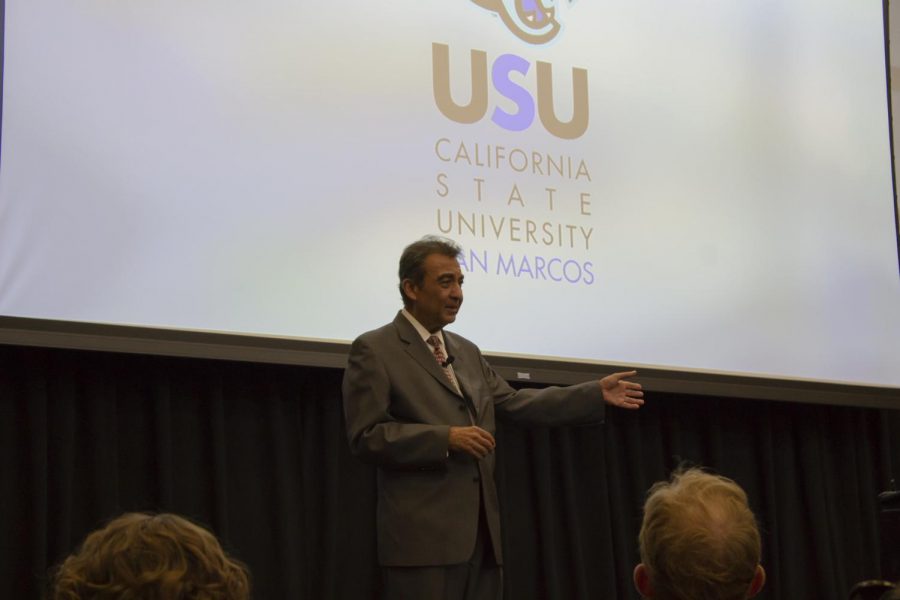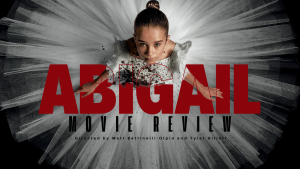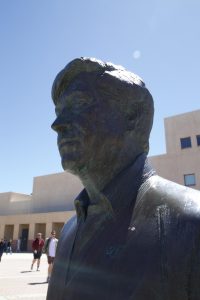Tragedy of late son motivates father to create social change
Photo credit: Krystina Andrade
Award winning author and peace activist Azim Khamisa speaks to audience members at the USU ballroom on Sept. 27.
October 13, 2018
World renowned speaker Azim Khamisa started the Tariq Khamisa Foundation in 1995 after he lost his son to gang violence at the age of 20 by Tony Hicks.
Khamisa’s only son, Tariq, was studying at San Diego State and working part-time as a pizza delivery boy.
It was during a delivery, after being lured to a fake address the 18-year-old gang member told Hicks, “Cap him. Cap him in his a–!”
Khamisa was motivated to start this foundation when he realized there were victims at both ends of the gun.
Hicks was convicted of first-degree murder and sentenced to 25 years to life in prison. He was the first 14-year-old to be charged as an adult in the state of California.
The “From Forgiveness to Peace” event shared Khamisa’s story and his experience with violence in society and the methods he used to cope and move past his own tragedy. The inaugural event was held on Sept. 13 in the USU Ballroom, presented by Arts & Lectures.
According to Ted.com, Khamisa’s goals of the San Diego non-profit are to “save lives of children, empower the right choices and teach principles of nonviolence, empathy, compassion, forgiveness and peacemaking.”
Khamisa represents an unconventional approach to problems and tragedies which normally destroy adolescents’ lives. He sees a crisis as a symbol of danger and opportunity and preaches the ideal that in order to achieve peace, we must accept that we are one human race.
Khamisa decided to turn his grief into the catalyst for change after many months of suffering from depression and suicidal thoughts because he knew there was, “no quality of life being a victim.”
Khamisa reached out to Ples Felix, the grandfather of Hicks in an effort to use differences to unite them instead of divide them. Now, Felix and Khamisa have been friends for more than 20 years and travel to different schools to share their story and teach the Safe School Model.
The Safe School Model and the TKF go hand in hand in educating children on: how to solve conflicts peacefully, working towards forgiveness and learning the value of each human and to treat them with love and kindness.
Khamisa stresses that the notion of violence is a learned behavior, as well as nonviolence and can therefore be taught. The Safe School Model has four different programs: Peace Club, Peace Educator, Restorative Workshop and Peacemaker Assembly.
Aside from the Tariq Khamisa Foundation, Khamisa educated the primarily student populated audience about Restorative Justice and the positive effects it has on criminal outcomes. Restorative Justice offers a holistic and humane approach for rehabilitation of offenders, teaching offenders how to be a contributing member of society again.
It took Khamisa five years after the shooting to be able to visit his son’s killer, Hicks, in prison. Once Khamisa worked up the courage to visit, Hicks told Khamisa that he prayed to God for forgiveness every single day and that he might get the chance to apologize to Azim. At this time, Khamisa invited Hicks to come work at the Tariq Khamisa Foundation when he gets out of prison.
Hicks is now 37 years old. He received his GED at the age of 22 and is currently working towards his associate degree in social work. Khamisa has been trying to get him out of prison for 12 years, and Hicks will finally go in front of the parole board on Nov. 28.






